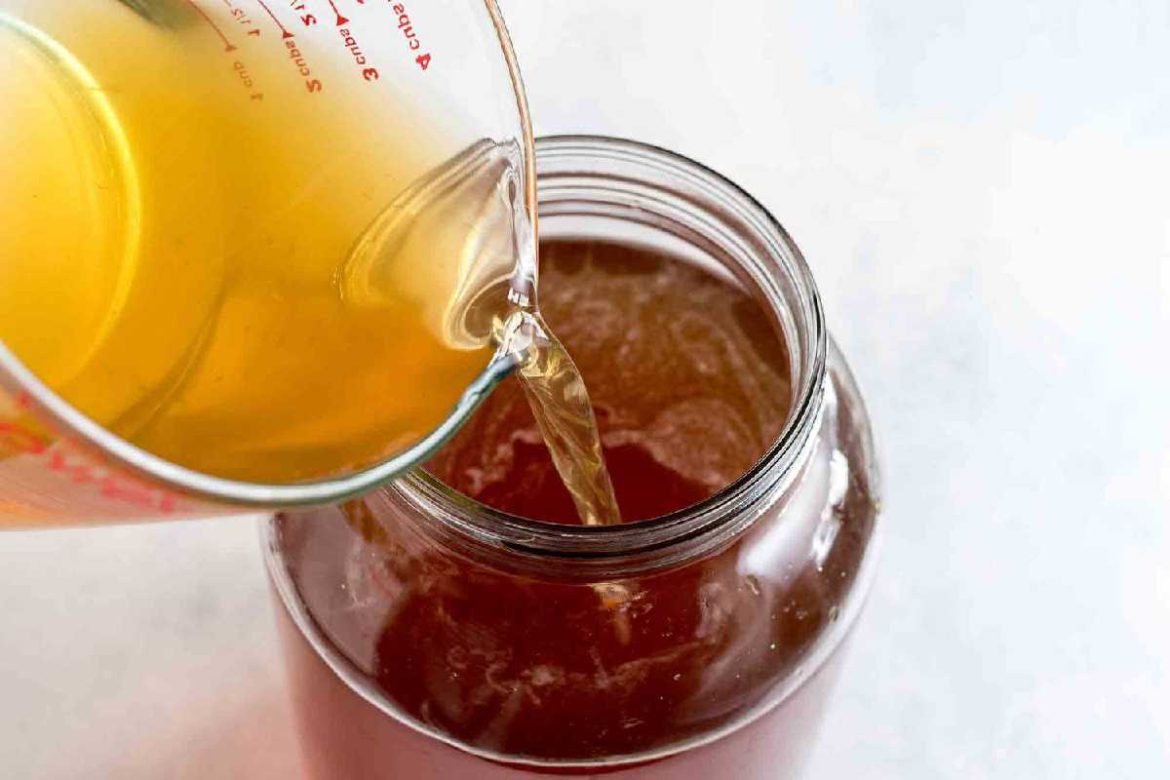Kombucha Recipe – Here is a recipe for making kombucha at home:
Ingredients:
14 cups (3.3 L) filtered or bottled Water
1 cup (200 g) white sugar
Eight bags of black or green tea
2 cups (480 mL) unflavored kombucha (either from a previous batch or unpasteurized, unflavored store-bought kombucha)
1 Scoby
Instructions:
Bring the water to a boil in a large pot.
Remove from the heat and stir in the sugar until it is completely dissolved.
Now add the tea bags to the boiled water and let steep for 5-10 mins.
Remove the tea bags and let the tea cool completely.
Combine the cooled tea, the unflavored kombucha, and the SCOBY in a large glass jar.
You must cover the jar with a tightly woven cloth or cheesecloth and secure it with a rubber band.
Place the pot in a warm, dark place (between 70 and 80 degrees Fahrenheit) for 7-14 days.
After 7-14 days, taste the kombucha. If it is sour enough to your liking, you can bottle it. If not, let it ferment for a few more days.
Once the kombucha is to your liking, bottle it in clean jars and store it in the refrigerator.
Tips:
You can use any tea, but black and green teas are the most common.
You can purchase one online or from a local health food store if you don’t have a SCOBY.
Keep the kombucha covered during fermentation to prevent mold from growing.
The longer you ferment the kombucha, the more sour it will become.
Once the kombucha is bottled, it will continue to ferment in the fridge. You can store it for up to 2 months.
What Is Kombucha?
Kombucha is a fermented tea relished for centuries for its purported health benefits. It is made by brewing black or green tea with sugar and a SCOBY, synergetic culture of bacteria and yeast. The SCOBY ferments the tea, producing a slightly fizzy, acidic drink that is said to have several health benefits.
Some of the potential health benefits of kombucha include:
Improved Gut Health:
Kombucha is a good home for probiotics, which are live bacteria that are helpful for gut health. Probiotics increase the immune structure and digestion and reduce inflammation.
Increased Energy:
Kombucha comprises small amounts of alcohol and caffeine, which boosts your energy.
Weight Loss:
Kombucha may help you to lose weight by suppressing your appetite and increasing your metabolism.
Improved Skin Health:
Kombucha contains antioxidants that can help to protect your skin from damage.
Reduced Risk Of Disease:
Kombucha has been shown to have anti-cancer and anti-inflammatory properties.
However, it is important to note that there is limited scientific evidence to support many of these claims. More research is needed to understand the health benefits of kombucha fully.
Risks Of Drinking Kombucha
Kombucha is usually safe to drink, but it has some potential risks. For example, kombucha can contain small amounts of alcohol, so it is not recommended for pregnant women or people taking medications that interact with alcohol. Additionally, kombucha can sometimes contain harmful bacteria, so it is important to ensure it is properly prepared and stored.
If you want to try kombucha, it is a good idea to start with a small amount and see how you react. You can also talk to your doctor about whether kombucha suits you.
Here are some additional things to keep in mind about kombucha:
The taste of kombucha can vary depending on the type of tea used, the length of fermentation, and the addition of flavorings.
Kombucha can be found at many health food stores and some grocery stores. You can also make your kombucha at home.
Kombucha is a good source of antioxidants but is not a substitute for a healthy diet and lifestyle.
Overall, kombucha is a safe and potentially healthy drink. However, it is important to drink it in restraint and to be aware of the potential risks.
Is It Fine To Drink Kombucha Every Day?
Yes, it is generally OK to drink kombucha every day. However, it is important to drink it in moderation, as too much kombucha can lead to some side effects, such as:
Digestive Upset:
Kombucha is a fermented food, and some people may face digestive upset, such as bloating, gas, or diarrhea if they drink too much of it.
Headache:
Kombucha contains small amounts of alcohol; some people may experience headaches if they drink too much.
Allergic Reaction:
Kombucha can sometimes contain harmful bacteria, so it is important to ensure it is properly prepared and stored. If you are allergic to kombucha, you may experience hives, itching, or swelling symptoms.
If you are new to kombucha, it is a good idea to start with a small amount and see how you react. You can also talk to your doctor about whether kombucha suits you.
Guidelines to Be Followed Before Drinking Kombucha
Here are some general guidelines for drinking kombucha in moderation:
Limit your consumption to 1-2 servings per day.
Choose a kombucha that is low in sugar and alcohol.
Look for kombucha that is made with organic ingredients.
Store kombucha in the refrigerator after opening.
If you have any concerns about drinking kombucha, talk to your doctor.
How Does Kombucha Work?
Here is how kombucha works:
The SCOBY is added to a black or green tea and sugar mixture.
The mixture is fermented for 7-14 days.
The SCOBY produces many beneficial compounds during fermentation, including probiotics, antioxidants, and enzymes.
The fermented mixture is then bottled and consumed.


